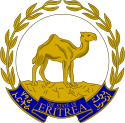
 |
|---|
| Constitution (not enforced) |
| Elections |
|
|
The politics of Eritrea and the government of Eritrea take place in the framework of a single-party presidential republican totalitarian dictatorship. The President officially serves as both head of state and head of government. The People's Front for Democracy and Justice is the only political party legally permitted to exist in Eritrea. The popularly elected National Assembly of 150 seats, formed in 1993 shortly after independence from Ethiopia, elected the current president, Isaias Afwerki. There have been no general elections since its official independence in 1993. A new constitution was drafted in 1993 and ratified in 1997, but has not been implemented.[1] Since the National Assembly last met in January 2002, president Afwerki has exercised the powers of both the executive and legislative branches of government.
Independent local sources of political information on Eritrean domestic politics are scarce; in September 2001 the government closed down all of the nation's privately owned print media, and outspoken critics of the government have been arrested and held without trial, according to domestic and international observers, including Human Rights Watch and Amnesty International. In 2004 the U.S. State Department declared Eritrea a Country of Particular Concern (CPC) for its alleged record of religious persecution.
- ^ "The Status of the Constitution of Eritrea and the Transitional Government". eri-platform.org (in Tigrinya). Retrieved 2023-02-27.